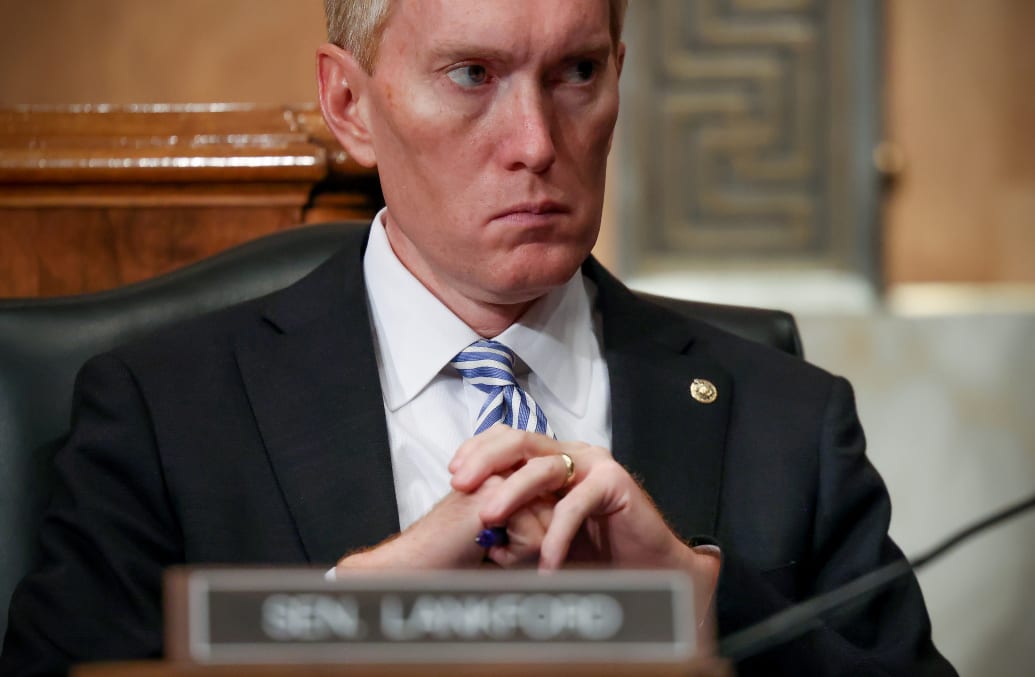After months of howling about the crisis at the U.S.-Mexico border, Republicans are now considering legislation in Congress that reads, at least in part, like a Republican wish list.
It steers $15 billion in new funding to the U.S. Border Patrol and to federal deportation authorities. It implements automatic shutdowns of the border if illegal crossings hit a certain number. And it revives several asylum policies from the Trump administration.
For years, Democrats have insisted that any new border enforcement bill would have to be paired with a pathway to citizenship for undocumented migrants. Democrats didn’t get anything close to that in this compromise. Instead, Democrats agreed to trade away significant hardline border enforcement policies for billions of dollars in security support for Ukraine, Israel, and Taiwan—dollars that many hawkish Republicans want anyway.
It’s a win-win for the GOP—and Republicans can’t wait to kill it.
“We can’t trust this president to seal the border,” Rep. John Duarte (R-CA) said on Monday. “And so whatever the policy in the bill is, doesn’t necessarily mean the president’s going to implement it faithfully.”
“I’m letting the terrible that is in this bill inform my opinion that it is just not good for the American people,” Sen. J.D. Vance (R-OH) told The Daily Beast. “If this was a good legislative package, I’d be the first to say so. It’s not good. It’s actually quite bad.”
“This is not a border bill,” said Sen. Rick Scott (R-FL). “This is an immigration bill.”
In a fairly shocking turn of events, a deal that was labored upon and hyped about for months as a potential solution to an intractable problem fell apart in a matter of hours. A Senate floor vote on the deal was initially scheduled for Wednesday, but that timing—and the bill’s fate in general—seems increasingly doomed.
All of this for a bill that quickly earned the endorsement of the labor union for the U.S. Customs and Border Patrol, an influential group for the GOP that is on the literal front lines of the so-called border crisis.
Still, Republicans began publicly torching the deal as soon as it was unveiled on Sunday night, after months of negotiations between Sens. James Lankford (R-OK), Kyrsten Sinema (I-AZ), and Chris Murphy (D-CT).
Facing immense pressure from MAGA politicians and media personalities riling up the base, scores of GOP lawmakers quickly lined up against the measure. By Monday evening, the deal had 20 Republican senators on record opposing it—a number approaching half of the GOP conference. Close allies of Senate Minority Leader Mitch McConnell (R-KY), who supported negotiations and the final product, were noncommittal.
Now, McConnell is reportedly telling his conference to vote ‘no’ on a procedural motion for the bill, knowing the measure is likely to be rejected at the moment.
Meanwhile, in the House, it might be noteworthy if any Republican ends up voicing public support for the legislation.
In a rare joint statement on Monday, the entire House GOP leadership team declared the bill dead on arrival, ensuring it wouldn’t even get a vote in that chamber. “Any consideration of this Senate bill in its current form is a waste of time,” they wrote.
On a policy basis, there’s plenty in the compromise that Republicans say they find objectionable. Many expressed alarm at the proposal to give the U.S. Citizenship and Immigration Services—which is an arm of the Department of Homeland Security—power to process asylum claims and not immigration courts.
The proposal to shut down the border only if illegal crossings exceed 5,000 per day, rhetorically, isn’t popular among Republicans. Many Republicans instead believe the border should be shut down for anyone illegally crossing—a talking point that sounds attractive if you want to appear tough on immigration, but in practice shooting down this deal just means extending current policies that allow for far more border crossers and asylum claims.
Of course, some hard-right lawmakers also oppose the bill because it supplies funding to Ukraine, a country they think should fend for itself at this point, even if that means Vladimir Putin seizes control of it.
But on Monday, the blowback to the bipartisan deal came so swiftly and overwhelmingly that Lankford questioned if his colleagues had bothered to read the legislation at all.
Perhaps naively, Lankford proceeded all along as if Republicans understood compromise would be the only path to easing the crisis at the border, given that Democrats control the Senate and the White House. At least, he proceeded as if enough of them understood that reality of governing.
But not only did these dealmaking Republicans underestimate how many of their colleagues seem content to let the perfect be the enemy of the good, they also miscalculated how many would gladly squander a chance to address a glaring problem if it means preserving a political issue against Democrats in 2024.
What’s becoming increasingly clear is that Republicans are not going to cross their presumptive nominee, Donald Trump, who has been clear that he’d rather not take steps to fix any perceived problems at the border so long as Joe Biden is president.
In a Monday interview with Newsmax, Trump responded to a question about the border deal helping Democrats in 2024 by saying the bill “is not a good thing for Lankford,” with Trump falsely claiming he never endorsed Lankford for Senate.
The speedy GOP rebuke left Lankford a little surprised, though he also saw the harsh political realities. “Obviously, a chaotic border is helpful to him,” he said of Trump during a CNN interview on Monday afternoon.
While Democratic support for the deal is far from universal, many in that party were dumbstruck by the naked calculations on the GOP side.
“The hypocrisy is glaring about no interest in trying to solve the border crisis. It really is a political issue for them,” Rep. Rosa DeLauro (D-CT)—the top Democrat on the House Appropriations Committee—told The Daily Beast.
“Just gobsmacked. I’ve never seen anything like it,” tweeted Sen. Brian Schatz (D-HI). “They literally demanded specific policy, got it, and then killed it.”

Evelyn Hockstein/Reuters
Even Republicans acknowledge that the presidential politics were shaping the GOP opposition. Some, like Rep. Troy Nehls (R-TX), are simply arguing Republicans should kill the bill so they don’t deliver a win for Biden.
Asked if the 2024 presidential election was influencing the politics of the bill, House Foreign Affairs Committee Chairman Michael McCaul (R-TX) was clear-eyed. “Sure,” he said.
“I’m not sure that the House will have the appetite for it,” McCaul added. “And I’m not even sure it can pass out the Senate.”
Sen. Joni Ernst (R-IA), the Senate’s No. 4 Republican, told reporters she was “very disappointed” about the widespread GOP opposition to the bill before the text even dropped.
“Some of them are colored by outside influence,” Ernst said of her Republican colleagues who opposed the bill before reading it. “Some of them just don’t want to do Ukraine funding.”
The reaction might seem inevitable now, but for months, senators toiled away on a compromise in hopes of making it easier to accomplish two separate and politically challenging tasks: addressing the deteriorating situation at the border, and supporting allies in Ukraine and Israel.
As a growing number of Republicans vocally opposed additional U.S. aid to Ukraine, the White House proposed an idea in October straight out of Hamilton: solve one problem with another. Biden hoped to tie funding for Ukraine to money for border enforcement, as well as aid to Taiwan and Israel.
Republicans—quick to play hardball with the Biden administration—rejected the White House’s initial $106 billion proposal, which allocated $13.6 billion for “border security and enforcement.” Throwing money at the problem, Republican detractors argued at the time, was a Band-Aid for a border-sized problem. If the increasingly isolationist GOP was going to swallow aid for Ukraine, it had to be packaged with substantive immigration restrictions.
With Senate leadership’s blessing, Murphy, Lankford, and Sinema got to work hammering out an immigration deal with White House liaisons, including Homeland Security Secretary Alejandro Mayorkas, weighing in.
The drawn out talks increasingly agitated both left-wing Democrats and hard-right Republicans. Progressive Democrats worried any compromise immigration bill would abandon migrants, with many Democrats seeing Ukraine aid as the main GOP concession, and members of the Congressional Hispanic Caucus lamenting that leadership iced them out of negotiations.
Meanwhile, hard-right Republicans said they would only support a House-led, sweeping restrictive immigration package known as H.R. 2, which was full of conservative border enforcement priorities that no Democrat supported when the House voted on the measure last year. The bill has never stood a chance in the Senate, but many conservatives adopted a position of accepting H.R. 2 or not negotiating at all.
House Speaker Mike Johnson (R-LA) has aligned himself with those conservative contrarians.
At first, Johnson engaged with the Senate, meeting with Republican senators at private lunches where he advocated for Ukraine-border legislation. But as the negotiations took on increasingly powerful conservative opponents—from Heritage Action for America to Trump—Johnson soured on the border talks.
Before negotiators even released the text of their bill, Johnson declared it “dead on arrival” in the House.
Some Republicans are still insisting the only way forward is H.R. 2.
“The compromise I want is H.R. 2. And we can nip it and tuck it, there's probably more in there that needs to be there,” Duarte said, suggesting that by way of compromise he’d be open to adding a “DACA fix” to H.R. 2, referring to the Deferred Action For Childhood Arrivals program.
“Look for some big sweeteners that solve some real problems,” Duarte said. “But don't give us a half-baked border bill that's not gonna give us security.”
If that’s the position of most GOP lawmakers, it will be one of many reasons why nothing will get done to address the border this year—something all of them have framed as an urgent priority.
During a Fox News interview on Monday, Lankford asked a relevant question.
“Are we, as Republicans,” he said, “going to have press conferences and complain the border is bad and then intentionally leave it open after the worst month in American history in December?”
The answer seems to be getting clearer by the minute.


